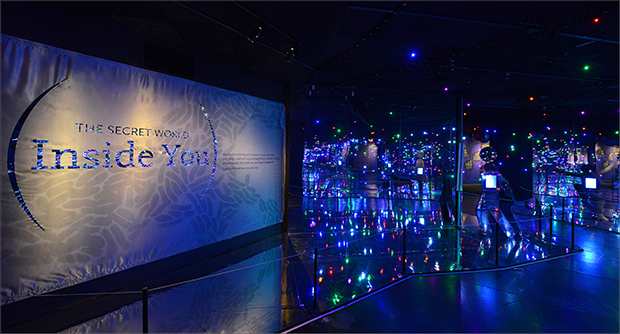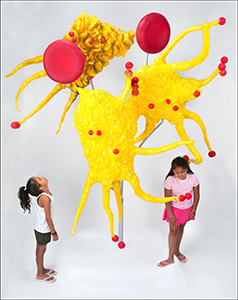Museum Delves Into The “Secret World”

By Marie Consola
The American Museum of Natural History, founded in 1869, is one of the world’s preeminent scientific, educational, and cultural institutions. The Museum encompasses 45 permanent exhibition halls, including the Rose Center for Earth and Space and the Hayden Planetarium, as well as galleries for temporary exhibitions. It is home to the Theodore Roosevelt Memorial, New York State’s official memorial to its 33rd governor and the nation’s 26th president, and a tribute to Roosevelt’s enduring legacy of conservation.
The Museum’s five active research divisions and three cross-disciplinary centers support approximately 200 scientists, whose work draws on a world-class permanent collection of more than 33 million specimens and artifacts, as well as specialized collections for frozen tissue and genomic and astrophysical data, and one of the largest natural history libraries in the world.
We’ve explored earth, the seas and outer space, but as much as biology and medical science have advanced over the years, we still have a long way to go in understanding the human body. The American Museum of Natural History has taken a major step in that direction.

Featuring interactive activities, videos, and a live theater, The Secret World Inside You, explores the rapidly evolving science that is revolutionizing how we view human health. Our bodies are home to many trillions of microbes, including bacteria, viruses, fungi, and other organisms collectively called the human microbiome. In any human, microbial genes outnumber the genes in human DNA by more than 100 to 1. Your body also contains more microbial cells than human cells. This new perspective leads us to look at our bodies not just as individuals but as entire ecosystems.
Investigating the human microbiome is a very young science and researchers are just beginning to understand what constitutes a “normal” microbiome, how it changes over time, and how it affects health and disease. But what is clear is that the effects of the microbiome on its human host are profound and multifaceted and could play an important role in common health problems like allergies, asthma, obesity, and even anxiety and depression.
The Secret World Inside You takes visitors on a tour of the human body, making stops at places where microbes thrive: your skin, which, covering about 20 square feet, is your largest organ, your mouth and your gastrointestinal tract, which is home to your body’s densest and most diverse microbial community, and your reproductive system, where babies encounter their first big batch of microbes as they exit the birth canal.
How does your interactions with microbes (from the type of environment where you grew up to the number of times you have taken an antibiotic, which destroys both bad and good bacteria) influence your health? In what ways can your microbiome be said to be its own organ? And is it possible that the state of the bacteria in your gut plays a role in your mental health?
The Secret World Inside You, on view until August 14, 2016, will explore these intriguing questions and more. This project is supported by the Science Education Partnership Award (SEPA) program of the National Institutes of Health (NIH).
Through its Richard Gilder Graduate School, the museum is the only American museum authorized to grant the Ph.D. degree. In 2012, the Museum began offering a pilot Master of Arts in Teaching program with a specialization in Earth science, which is the only non-university affiliated such program in the United States.
Annual attendance has grown to approximately 5 million, and the Museum’s exhibitions and Space Shows can be seen in venues on five continents. The Museum’s website and collection of apps for mobile devices extend its collections, exhibitions, and educational programs to millions more beyond its walls.
The Museum has named two documentary films as winners of the Margaret Mead Award, named for the famed anthropologist who passed away in 1978. The Margaret Mead Filmmaker Award recognizes documentary filmmakers who embody the spirit, energy, and innovation demonstrated by Mead in her research, fieldwork, films, and writings. The award is given to a filmmaker whose feature documentary offers a new perspective on a culture or community while displaying artistic excellence and originality in storytelling. Eligible filmmakers must present a U.S. premiere at the Margaret Mead Film Festival.
Leaving Africa offers a personal look at a unique relationship born in and defined by the fight against the continent’s population explosion, while Tentmakers of Cairo provides a close-up look at one of the defining political crises of the decade and a fascinating microcosm of a transitioning nation.
Visit www.amnh.org for more information.



